法语前后缀
法语词根记忆法:前缀与后缀

Préfixes et suffixes grecs ou latinsemployés dans la construction des mots françaisLe document est volontairement étendu, mais la recherche ne s'effectuera que sur les préfixes et suffixes les plus courants ou les plus "parlants" pour les élèves (mots rencontrés en géométrie, en mathématiques, en éveil, lus dans la presse...etc). Par exemple:un polygone, la géographie, un dinosaure, la psychologue, un thermomètre...A. Composition par préfixes1/ Préfixes tirés du grec (formant surtout des mots scientifiques)2/ Mots grecs servant de préfixes ou entrant dans la composition des mots français3/ Préfixes d'origine latine ou mots latins entrant dans la composition des mots françaisB. Composition par suffixes 1/ Suffixes d'origine grecqueRecherches collectives et mots proposés par les élèves: Un hélicoptère: hélico: hélice; ptère: aile.Qui a une aile en forme d'hélice.Un hexagone:hexa: six; gone: angle.Une figure qui a six angles (six sommets)Un polygone: poly: nombreux, gone: angle.Une figure qui possède plusieurs angles.La psychologue: psycho: âme; logue: qui étudie.Un spécialiste qui étudie l'esprit des gens.Un pyromètre:pyro: feu, flamme; mètre: mesure.Un appareil qui mesure les hautes températures.Un pyromane:pyro: feu; mane: folie, passion.Une personne qui met le feu par folie.Un myriapode: myria: dix mille; pode: piedsUn mille-pattes.xénophobe: xeno: étranger; phobe; qui craint, qui a peur qui n'aime pas les étrangers (syn. raciste)une mégalithe: méga: grand; lithe: pierreUne grosse pierre, comme par exemple un menhir.un anémomètre: anémo: vent; mètre: mesureUn instrument qui mesure la vitesse du vent (météorologie, marine)une mégalopole: mégalo: grand; pole: villeUne très grande ville.l'archéologie: archéo: ancien; logie: scienceScience qui étudie les objets anciens: monuments, ruines, poteries, statues...la physiologie: physio: nature; logie: scienceScience qui traite des fonctions de la vie (mouvements, muscles; digestion...) mythomane: mytho: légende, invention; mane: foliePersonne qui fabule, qui s'invente des histoires et qui y croit.chronomètre: chrono: temps; mètre: mesureInstrument qui mesur e le temps avec précision.microscope:micro: petit; scope: voirInstrument d'optique qui permet d'observer les objets minusculesla philosophie: philo: qui aime; sophie: la sagesseActivité des penseurs qui se posent des questions et réfléchissent pour faire évoluer le monde. un baromètre: baro: pesanteur; mètre: mesureInstrument météo qui mesure la pression de l'atmosphère.Mots proposés par les enfants:l'orthographe:la calligraphie: une psychothérapie:aérodynamique:une bibliothèque:la monarchie:l'astronomie:architecture:géomètre: mythomane: télégraphe: mythologie télégraphe stéthoscope microphone: géologie: pentagone: géométrie: hydrogène: aérolithe: amphibien: dynamique: télescope: herbivore: carnivore: synonyme: coléoptère. thermomètre: aristocrate: gastronomie: prototype: biologie:orographie: cryptogramme:zoologie:photographie:astronomie:chronologie:amphibie:démocratie:sémaphore:biographie:panorama:encyclopédie:homonyme:orthophoniste:pathologie:hydrofuge:stéréophonie:(注:可编辑下载,若有不当之处,请指正,谢谢!)。
法语构词法
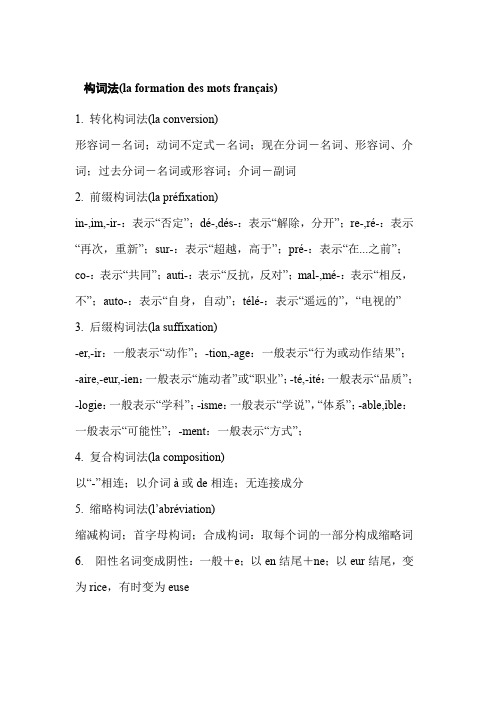
构词法(la formation des mots français)
1. 转化构词法(la conversion)
形容词-名词;动词不定式-名词;现在分词-名词、形容词、介词;过去分词-名词或形容词;介词-副词
2. 前缀构词法(la préfixation)
in-,im,-ir-:表示“否定”;dé-,dés-:表示“解除,分开”;re-,ré-:表示“再次,重新”;sur-:表示“超越,高于”;pré-:表示“在...之前”;co-:表示“共同”;auti-:表示“反抗,反对”;mal-,mé-:表示“相反,不”;auto-:表示“自身,自动”;télé-:表示“遥远的”,“电视的”
3. 后缀构词法(la suffixation)
-er,-ir:一般表示“动作”;-tion,-age:一般表示“行为或动作结果”;-aire,-eur,-ien:一般表示“施动者”或“职业”;-té,-ité:一般表示“品质”;-logie:一般表示“学科”;-isme:一般表示“学说”,“体系”;-able,ible:一般表示“可能性”;-ment:一般表示“方式”;
4. 复合构词法(la composition)
以“-”相连;以介词à或de相连;无连接成分
5. 缩略构词法(l’abréviation)
缩减构词;首字母构词;合成构词:取每个词的一部分构成缩略词6. 阳性名词变成阴性:一般+e;以en结尾+ne;以eur结尾,变为rice,有时变为euse。
法语词根词缀整理版

分裂
-scope/scopie
观察仪器;观察,检查
séma-
记号,信号,
sidér(o)-
铁
somat(o)-
躯体
spélé(o)-
洞穴
sphér(o)-
球
-sphère
球
stéré(o)-
立体的;坚固的
stomat(o)-
口,口腔
syn-/sym-
共,同,合
tachy-
快,迅速
-taphe
年龄,生日
-aire
2.形容词的后缀
特征,关系
-ain, -aire, -é, -el, -al, -er, -eur, -if, -in, -ique, -atoire
可能性
-able, -ible, -uble
最高级
-issisme
排序,倍数
-ième, -ple
3.动词的后缀
行为,动作
-iser, -ifier, -oyer
正;真;正确;整形
-ose
(非炎症)疾病,病变
osté(o)-
骨
ot(o)-
耳
oxy-
尖锐的;酸的;氧的
pachy-
厚的
paléo-
古;早期;史前
pan-/pant(o)-
泛,全部
par(a)-
旁,旁近
-pare
生,生殖
path(o)-
疾病,痛苦
-pathe
患…病的;受…之害的
-pathie
疾病
péd(o)-
électr(o)-
琥珀(专指电)
embryo-
胚胎
-èmie
最新法语词汇前缀表
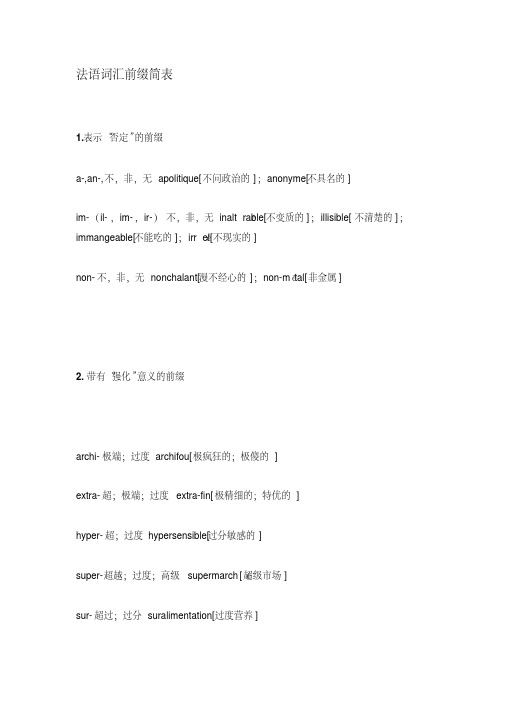
法语词汇前缀简表1.表示“否定”的前缀a-,an-, 不,非,无 apolitique[不问政治的];anonyme[不具名的]rable[不变质的];illisible[不清楚的];im-(il-,im-,ir-)不,非,无 inaltéel[不现实的]immangeable[不能吃的];irrénon- 不,非,无 nonchalant[漫不经心的];non-métal[非金属]2. 带有“强化”意义的前缀archi- 极端;过度 archifou[极疯狂的;极傻的]extra- 超;极端;过度 extra-fin[极精细的;特优的]hyper- 超;过度 hypersensible[过分敏感的]super- 超越;过度;高级 supermarché[超级市场]sur- 超过;过分 suralimentation[过度营养]ultra 超;过度;极端 ultramoderne[极现代化的]3. 表示“同情”、“敌视”或“对立”的前缀mocratique[反民主的]anti- 反对,反抗 antidéantidote[解毒的]contre- 反对;相反 contre-attaque[反击]pro- 赞成,亲 procommuniste[赞成共产党的]prochinois[亲华的]4. 表示“时空关系”的前缀combrien[前寒武纪的]antép oser[前置,放在前面] anté-先,前;在…之前 antéaprès-post- 后;在…之后 après-demin[后天]après-gurre[战后]postface[后记,跋]avant-pré- 先,前,在…以前 avant-hier[前天]préétabli[预定的]co-con- 共,同,合,和,相互 co-auteur[合作者] concitoyen[同乡]entre- 之间 entreacte[幕间休息]ex- 前 ex-ministre[前部长]extra- 外;在…之外 extra-terrestre[地球之外的] inter- 在…之间 interscolaire[校际的]intra- 内部,在内 intramusculaire[肌肉内的] trans- 横贯,穿过 transnational[跨国的]5. 常见动词前缀a- 方向;目的,使 abaisser[放下]attendrir[使变软]poser[前置]anté-先,前 antéauto- 自行,自动;自身 automatiser[使自动化]co- 共,同,合,相互 coexister[共存]con-col-com-cor- 共,同,合,相互 concorder[相符,协调] combiner[组合,联合]collaborer[合作,协作]correspondre[符合]contre- 反对;相反 contre-attaquer[反攻,还击]dé-,dés- 分离;去除,解除 dépoétiser[使失去诗意] dis- 否定 disjoindre[拆开]é-,ef-,es- 分离,去除,失去échanger[交换,互换] égarer[使迷路]en-,em- 使成为 engraisser[使肥沃]emmaigrir[使消瘦]entr- 相互s’entretuer[自相残杀]ex- 出,外 exclure[开除;排斥]in-,il-,im- 不,无,非;向,入,内 invalider[使无效]impatienter[使不耐烦]inter- 禁止相互关系 interdire[禁止]interconnecter[使…互连]intro- 向内,进入 introduire[引入,介绍]mal- 坏,恶;错 malmener[虐待]micro- 微,小 microminiaturiser[使微型化]mono- 单独的 momologuer[自言自语] monopoliser[垄断,专营]multi- 多,复 multiplier[增多]poly- 多,聚 polycopier[油印]post- 后,在…后 postposer[后置,放在后面] pré- 前 prév enir[预防]- 再,重新 refaire[重做]re-,réréimprimer[重印]r- 逆,反 rajuster[再调整]rétro- 向后,追溯 rét roagir[追溯既往]sous- 不足;再 sous-amender[再修正]sub- 再,在…下 subordonner[使从属于] super- 在上面;超越 superfinir[超精加工] sur- 在上;超过 surmonter[置于…上]trans- 横贯,穿过;变化 transcrire[眷写]transpercer[穿过]ultra- 超过,极度 ultracentrifuger[超速离心分离] uni- 单一 unifier[统一,划一]法语后缀词总汇高的;顶点,肢端,起首levé, àl’extrémitéacro- éactino- rayon 射线,光线adéno- glande 腺aéro- air 大气,空气;空中,航空agro- champ 农田;农业allo- autre 另外,其他,别;异常amphi- autour ; doublement 周围;双,两re àrebours 在后面;倒,逆,反;再,重ana- en qrrièandro- homme 男,雄anémo- vent 风angéio-/angi(o)- vaisseau capsule 血管,淋巴管;种皮,果皮anth(o)- fleur 花anthrac(o)- charbon 媒anthropo- homme 人,人类gation 远离;(相互)否定ap(o)- loin de néarchéo- ancien 古,古代arithm(o)- nombre 数re 动脉rio- artèartéarthr(o)- articulation 关节toile 星,天体astér(o)-/astr(o)- astre, érie) 棍状物(专指细菌)bactér i(o)- baton (d’oùbactébaro- pesant 重力bary- lourd 重biblio- livre 书籍bio- vie 生命blasto- germe 胚,胚胎brachy- court 短的brady- lent 缓慢的bronch(o)- bronches 支气管bryo- mousse 苔藓caco-, cach- mauvais 坏,劣,差calli- beau 美carcin(o)- cancer 癌cardi(o)- c?ur心脏cata- de haut en bas 下,向下te 头,颅céphal(o)- têchalco- cuivre 铜cheir(o)-/chir(o)- main 手chlor(o)- vert 绿色chol(é)- bile 胆chromat(o)-/chrom(o)- couleur 颜色;染色质chron(o)- temps 时间chrys(o)- or 黄金;金黄色ciném at(o)-/ciném(o)- mouvement 动,运动ment 粪copro- excrécosm(o)- monde 宇宙‘世界cryo- froid 低温,冷冻隐藏的crypt(o)- cachécycl(o)- cercle 圈,环;循环cyto- cellule 细胞dactyl(o)- doigt 指,趾démo- peuple 人民;人口derm(o)-/dermato- peau 皮,皮肤di- deux 二,双;二重travers 分离;通过,横过paré de, àdi(a)- sédiplo- double 两,复,双重dodéca- douze 十二dolicho- long 长的dynam(o)- force 力,动力tqt 困难;不良,不正常dys- difficulté, mauvais érissonéchino(o)- héecto- en dehors 外面,外部) 琥珀(专指电)électr(o)- ambre jaune (d’oùélectricitéembryo- f?tus胚胎encéphal(o)- cerveau 脑end(o)- à内,内在l’intérieurentér(o)- entrailles 肠entomo- insecte 昆虫épi- sur 在上面,在…之上;在后面,在…之后erg(o)- action, travail 功;工作ethn(o)- peuple 人种;种族re m?urs品性;习性étho- caractéeu- bien 好,优exo- au-dehors 外,在…外galact(o)- lait 乳gam(o)- mariage union 婚配;结合gastro- ventre estomac 腹;胃géo- terre 大地;地球géront(o)- vieillard 老人gloss(o)- langue 舌;语音r(o)- doux, sucré甜的;含糖的gluc(o)-/glyc(o)-/glycècrire 书写graph(o)- égyn(éco)- femme 女性,雌性gyro- cercle 旋转hapl(o)- simple 单,简单hect(o)- cent 百héli(o)- soleil 太阳mo- sang 血hémat(o)-/héhémi- demin moitié半hépat(o)- foie 肝hept(a)- sept 七hétéro- autre 异hex(a)- six 六圣,神圣hiér(o)- sacréhipp(o)- cheval 马hist(o)- tissu 组织holo- centier 完全homéo-/hom(o)- semblable 同,类似hor(o)- heure 时间;小时hydr(o)- eau 水hygro- humide 湿s 超出,在…上;过度hyper- ser, au-dessus; excèhypn(o)- sommeil 睡眠;催眠hypo- sous; insuffisance 下,在…下;少,不足rus 子宫hystér(o)- utéicon(o)- image 像,肖像;图像e 思想,观念idé(o)- idéidi(o)- particulier 特有的,个人的gal 等,同iso- élaryng(o)- gorge 喉leuco- blanc 白litho- pierre 石log(o)- discours science 讲话;词;言语macro- grand 大的;长的;巨型的;宏观的mega-/mégalo- grand 巨大的;强有力的mél(o)- chant 歌;音乐més(o)- milieu 中间;中介s changement 继…之后,位于…之后;变化;超越méta- aprèmétr(o)- mesure 计量,度量micro- petit 小的,微小的mis(o)- haine 厌恶,嫌忌mnémo- mémoire 记忆,回忆mon(o)- seul 单,一morpho- forme 形态my(o)- muscle 肌肉myco- champignon 真菌myél(o)- moelle 髓,脊髓gende 神话myth(o)- lénécro- mort 死;尸体néo- nouveau 新néphr(o)- rein 肾vr(o)- nerf 神经neur(o)-/nénoso- maladie 疾病octa-/octo- huit 八odont(o)- dent 牙齿olig(o)- peu nombreux 少;小onir(o)- songe 梦ophtalm(o)- ?il目,眼ornitho- oiseau 鸟oro- montagne 山ortho- droit 正;真;正确;整形osté(o)- os 骨ot(o)- oreille 耳oxy- aigu, acide 尖锐的;酸的;氧的pachy- épais 厚的paléo- ancien 古;早期;史前pan-/pant(o)- tout 泛,全部par(a)- voisin de 旁,旁近path(o)- souffrance 疾病,痛苦péd(o)- enfant 儿童penta- cinq 五péri- autour 周围phago- manger 吃,食dicament 药,药物pharmac(o)- mépharyng(o)- gosier 咽喉phèn(o)- appara?tre, briller 显出,表现;闪耀phil(o)- aimer 幸,爱好phon(o)- voix, son 声;音re 光photo- lumièphyllo- feuille 叶phys(io)- nature 自然phyt(o)- plante 植物plouto- richesse 财富pneumo- poumon 肺pod(o)- pied 脚,足poly- nombreux 多pro- devant;pour, partisan de;à la place de 在前;亲,赞成;代替prot(o)- premier 第一的,最初的,原始的pseud(o)- faux 伪,假psych(o)- a me 精神,灵魂,心理ptéro- aile 翅pyr(o)- feu 火rhéo- couler 流,流动rhino- nez 鼻rhizo- racine 根rhodo- rose 玫瑰色sarco- chair 肉schizo- fendre FEN裂séma- signe 记号,信号,sidér(o)- fer 铁somat(o)- corps 躯体spélé(o)- caverne 洞穴sphér(o)- globe 球stéré(o)- solide 立体的;坚固的stomat(o)- bouche 口,口腔syn-/sym- avec, ensemble 共,同,合tachy- rapide 快,迅速me 同样tauto- le mêtaxi- arrangement 安排,整理techn(o)- art, science 技术,工艺distance 远,远距离télé- de loin àtétra- quatre 四thalasso- mer 海théo- dieu 神therm(o)- chaleur 热top(o)- lieu 地方re 型,版typo- caractèur(o)- urine 尿tranger 外国人;陌生人xén(o)- éxér(o)- sec 旱,干燥xylo- bois 木zoo- animal 动物Préfixes d’orig ine latinsab-/abs- loin deséparé de 偏离,离开,脱开à(运动)方向;添加ad- vers, ajoutéambi- les deux, de part et d’autre两,双bi-/bis- deux 二,两,双,重circon-/ circum- autour 周围cis- en de?à de 这边,这里col-/com-/con-/cor- avec 共,同,集;互相gation 分开,分离;不,否定dis- séparé de, néen-/em- dans, transformation 在其中;使成为1.外,出2.前任d’êtreex- hors de;qui a cesséin-/im- dans 内,入de 无;非,不il-/im-/in-/ir- privéinfra- en dessous 在下,下面s de 近傍juxta- au prè一半,正中mi- (à) moitiémilli- division par mille 千分之一multi- nombreux 多的,多方面的omni- tout 全,一切,所有para- protection 防;保护péné- presque 几乎,近于pluri- plusieurs 多个后post- aprèriorités,posté前,先pré- avant,postérioritépro- e, ava,t 向前,前进quadr(i)/quadru- quatre 四quasi- presque 准quinqu- co,q 五radio- rayon 光线;房舍,辐射;无线电 de nouveau 再,重新r(e)-/rére 追溯;向后rétro- en retour, en arrièsemi- àdemi partiellement 一半;部分地simili- semblable 类似,模仿sub- sous 次,亚,副;分;下面,往下supre-/supra au-dessus 超,上;超级sus- au-dussus 在上;在前;高于travers 变化,转换;横贯,穿过de, àtrans- au-delàtri- trois 三de 超,越‘极端’在…之外ultra- au-delàuni- un 一,单la place de 副,次;代理vice- à。
法语词缀

1. -ABLE, -IBLE, -UBLE 表示possibilité active ou passive 例词blâmable(应当受责备的), éligible,(有选举资格的) soluble(可溶解的,可解决的)2. –AIRE 表示qui a rapport à 和……有关的例词légendaire(传奇的,和légende有关的)3. -AIS, -OIS 表示quihabite例词liégeois(列日的列日,比利时的一个省)4. -AL, -EL 表示qui a le caractère de 有……品德的,例词:royal(国王的,王室的), mortel(必死的,致命的,有mort的特点)5. –AN表示 qui habite, disciple de 例词persan(波斯的,波斯人的), mahométan(伊斯兰教的, Mahomet 宗教中的默罕默德, 默罕默德的门徒, 用an表 disciple de Mahomet 也就是伊斯兰教的)6. –ARD 表示caractère, péjoratif例词montagnard(山区的,表示有montagne的特点), vantard(爱吹牛的,好夸口的)7. –ATRE 表示approximatif, péjoratif例词noirâtre(稍黑的,带黑的,表示近似), bellâtre(自炫其美的(男子))8. –E 表示qui a le caractère de 例词azuré(天蓝色的,蔚蓝色的,lavoûteazurée诗歌中用的,表示天空来自于名词azur蔚蓝色,天空),imagé(形象化的,富于比喻的来自image形象,映像)9. –ESQUE 表示qui a rapport à 例词chevaleresque(骑士的,骑士风度的chevalier 骑士)10. -ET, -ELET表示diminutifs例词propret(干干净净的,清清爽爽的), aigrelet(略带酸味的)11. -EUR, -EUX 表示caractère例词rageur (易怒的,脾气坏的来自名词rage大怒,狂怒), courageux(勇敢的,有勇气的来自名词courage)12. -ER, -IER 表示caractère例词bocager(诗歌小树林的,多数木的,来自名字bocage诗歌小树林), saisonnier(季节的,季节性的来自名词saison)13. –IEN 表示quihabite, qui s'occupe de 例词historien(历史学家的,历史学家)14. –IF 表示caractère例词tardif(迟的,晚的), craintif(胆怯的,惊恐的)15. –IN 表示caractère, diminutif例词enfantin(儿童的,孩子的,来自enfant)16. –IQUE 表示caractère, origine例词colérique(易怒的来自名词colère), volcanique(火山的,转义为暴躁的,激烈的,来自名词volcan)17. –ISSIME 表示superlatif,最高级的,极度的例词richissime(巨富的)18. –ISTE 表示caractère, relatif à unparti例词égoïste(利己主义的,自私的,名词为égoïsme利己主义,词根为égo,(心)自我,意识自己与实现的自我), socialiste(社会主义的)19. –OT 表示diminutif例词pâlot(脸色有些苍白的,不太有血色的来自pâle,苍白的)20. –U 表示qualité, abondance例词barbu(有胡子的来自名词barbe),feuillu(多叶的,叶茂的,名词feuille)21.–UEUX 表示abondance例词luxueux(奢侈的,豪华的,名词luxe),fructueux(结果实的,有收益的名词fructus果). ADE 用来表明collection , action,例词:colonnade(柱廊—表集合), glissade (滑动—表动作)2. AGE 用来表明collection, action, produit, état 例词feuillage(全部叶子—表集合), brigandage(抢劫—表动作), cirage(上蜡—表动作,或产品), servage(农奴身份—表状态)3. AIE, -ERAIE 用来表明plantation例词chênaie(栎树/橡树种植地chêne 为栎树/橡树,词根表种植)4. AIL表明为instrument 例词épouvantail (épouvante 惊恐的,épouvantail 吓唬人的东西,稻草人,词根表器具)5. AILLE 为了表达collection,action, péjoratif 例词pierraille(碎石堆—表示集合), trouvaille(新发现,是trouver的action), ferraille(fer是铁,ferraille是废铁,有péjoratif的意义在里面)。
法语词汇前缀表
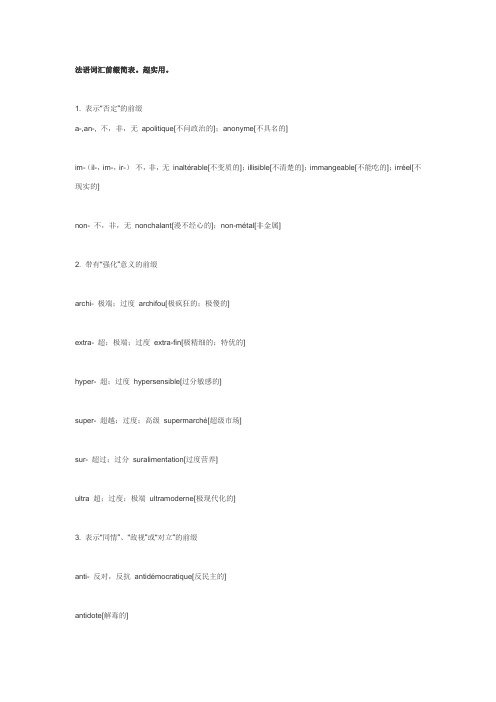
法语词汇前缀简表。
超实用。
1. 表示“否定”的前缀a-,an-, 不,非,无apolitique[不问政治的];anonyme[不具名的]im-(il-,im-,ir-)不,非,无inaltérable[不变质的];illisible[不清楚的];immangeable[不能吃的];irréel[不现实的]non- 不,非,无nonchalant[漫不经心的];non-métal[非金属]2. 带有“强化”意义的前缀archi- 极端;过度archifou[极疯狂的;极傻的]extra- 超;极端;过度extra-fin[极精细的;特优的]hyper- 超;过度hypersensible[过分敏感的]super- 超越;过度;高级supermarché[超级市场]sur- 超过;过分suralimentation[过度营养]ultra 超;过度;极端ultramoderne[极现代化的]3. 表示“同情”、“敌视”或“对立”的前缀anti- 反对,反抗antidémocratique[反民主的]antidote[解毒的]contre- 反对;相反contre-attaque[反击]pro- 赞成,亲procommuniste[赞成共产党的]prochinois[亲华的]4. 表示“时空关系”的前缀anté- 先,前;在…之前antécombrien[前寒武纪的]antéposer[前置,放在前面] après-post- 后;在…之后après-demin[后天]après-gurre[战后]postface[后记,跋]avant-pré- 先,前,在…以前avant-hier[前天]préétabli[预定的]co-con- 共,同,合,和,相互co-auteur[合作者]concitoyen[同乡]entre- 之间entreacte[幕间休息]ex- 前ex-ministre[前部长]extra- 外;在…之外extra-terrestre[地球之外的] inter- 在…之间interscolaire[校际的]intra- 内部,在内intramusculaire[肌肉内的] trans- 横贯,穿过transnational[跨国的]5. 常见动词前缀a- 方向;目的,使abaisser[放下]attendrir[使变软]anté- 先,前antéposer[前置]auto- 自行,自动;自身automatiser[使自动化] co- 共,同,合,相互coexister[共存]con-col-com-cor- 共,同,合,相互concorder[相符,协调] combiner[组合,联合]collaborer[合作,协作]correspondre[符合]contre- 反对;相反contre-attaquer[反攻,还击]dé-,dés- 分离;去除,解除dépoétiser[使失去诗意] dis- 否定disjoindre[拆开]é-,ef-,es- 分离,去除,失去échanger[交换,互换] égarer[使迷路]en-,em- 使成为engraisser[使肥沃]emmaigrir[使消瘦]entr- 相互s’ent retuer[自相残杀]ex- 出,外exclure[开除;排斥]in-,il-,im- 不,无,非;向,入,内invalider[使无效]impatienter[使不耐烦]inter- 禁止相互关系interdire[禁止]interconnecter[使…互连]intro- 向内,进入introduire[引入,介绍]mal- 坏,恶;错malmener[虐待]micro- 微,小microminiaturiser[使微型化] mono- 单独的momologuer[自言自语] monopoliser[垄断,专营]multi- 多,复multiplier[增多]poly- 多,聚polycopier[油印]post- 后,在…后postposer[后置,放在后面] pré- 前prévenir[预防]re-,ré- 再,重新refaire[重做]réimprimer[重印]r- 逆,反rajuster[再调整]rétro- 向后,追溯rétroagir[追溯既往]sous- 不足;再sous-amender[再修正]sub- 再,在…下subordonner[使从属于]super- 在上面;超越superfinir[超精加工]sur- 在上;超过surmonter[置于…上]trans- 横贯,穿过;变化transcrire[眷写] transpercer[穿过]ultra- 超过,极度ultracentrifuger[超速离心分离] uni- 单一unifier[统一,划一]。
法语词根记忆法-前缀与后缀
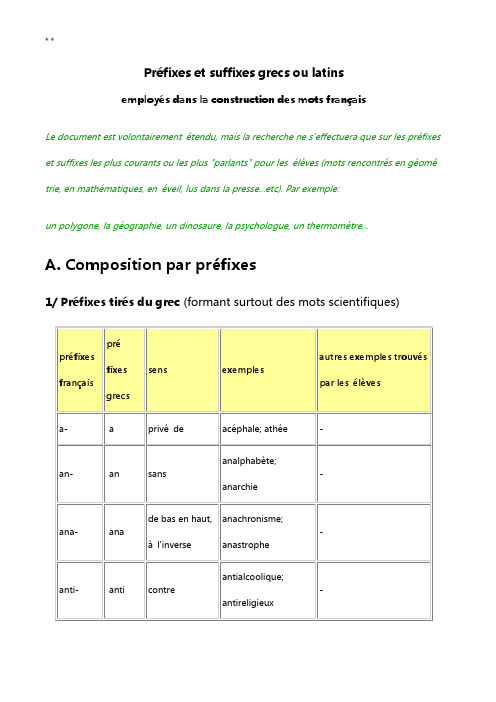
Préfixes et suffixes grecs ou latinsemployés dans la construction des mots françaisLe document est volontairement étendu, mais la recherche ne s'effectuera que sur les préfixes et suffixes les plus courants ou les plus "parlants" pour les élèves (mots rencontrés en géométrie, en mathématiques, en éveil, lus dans la presse...etc). Par exemple:un polygone, la géographie, un dinosaure, la psychologue, un thermomètre...A. Composition par préfixes1/ Préfixes tirés du grec (formant surtout des mots scientifiques)2/ Mots grecs servant de préfixes ou entrant dans la composition des mots français3/ Préfixes d'origine latine ou mots latins entrant dans la composition des mots françaisB. Composition par suffixes 1/ Suffixes d'origine grecqueRecherches collectives et mots proposés par les élèves: Un hélicoptère: hélico: hélice; ptère: aile.Qui a une aile en forme d'hélice.Un hexagone:hexa: six; gone: angle.Une figure qui a six angles (six sommets)Un polygone: poly: nombreux, gone: angle.Une figure qui possède plusieurs angles.La psychologue: psycho: âme; logue: qui étudie.Un spécialiste qui étudie l'esprit des gens.Un pyromètre:pyro: feu, flamme; mètre: mesure.Un appareil qui mesure les hautes températures.Un pyromane:pyro: feu; mane: folie, passion.Une personne qui met le feu par folie.Un myriapode: myria: dix mille; pode: piedsUn mille-pattes.xénophobe: xeno: étranger; phobe; qui craint, qui a peurqui n'aime pas les étrangers (syn. raciste)une mégalithe: méga: grand; lithe: pierreUne grosse pierre, comme par exemple un menhir.un anémomètre: anémo: vent; mètre: mesureUn instrument qui mesure la vitesse du vent (météorologie, marine)une mégalopole: mégalo: grand; pole: villeUne très grande ville.l'archéologie: archéo: ancien; logie: scienceScience qui étudie les objets anciens: monuments, ruines, poteries, statues... la physiologie: physio: nature; logie: scienceScience qui traite des fonctions de la vie (mouvements, muscles; digestion...) mythomane: mytho: légende, invention; mane: foliePersonne qui fabule, qui s'invente des histoires et qui y croit.chronomètre: chrono: temps; mètre: mesureInstrument qui mesure le temps avec précision.microscope:micro: petit; scope: voirInstrument d'optique qui permet d'observer les objets minusculesla philosophie: philo: qui aime; sophie: la sagesseActivitédes penseurs qui se posent des questions et réfléchissent pour faire évoluer le monde. un baromètre: baro: pesanteur; mètre: mesureInstrument météo qui mesure la pression de l'atmosphère.Mots proposés par les enfants:l'orthographe:la calligraphie:une psychothérapie: aérodynamique:une bibliothèque:la monarchie:l'astronomie:architecture:géomètre:mythomane:télégraphe:* *mythologie télégraphe stéthoscope microphone: géologie: pentagone: géométrie: hydrogène: aérolithe: amphibien: dynamique: télescope: herbivore: carnivore: synonyme:coléoptère.thermomètre:aristocrate:gastronomie:prototype:biologie:orographie:cryptogramme:zoologie:photographie:astronomie:chronologie:amphibie:démocratie:sémaphore:biographie:panorama:encyclopédie:homonyme:orthophoniste:pathologie:hydrofuge:stéréophonie:。
学习从法语后缀的语义和语法功能来辨析和扩展单词

《学习从法语后缀的语义和语法功能来辨析和扩展单词|》摘要:a.表示特征或关系:-ain,-aire,-é,-el,-al,-er, -eur,-if,-in,-ique,-atoire,等,表示贬义的有名词后缀-aille,-ard,-asse,-assier和-atre,另外还有动词后缀-ailler,-asser,-iner,-nicher,-ot(t)er,表示“小”的有名词后缀-aut(-eau),-elle,-et,-in,-ot,-on,-ille,-illon,-ole,-iche,以及动词后缀-ot(t)er,-iller本文的从派生构词法中的后缀入手分析,通过后缀的语法、语义功能和感情色彩几个方面,试图启发学生以灵活的方式来来辨析单词,从死记硬背中解放出来,培养一种对词缀的敏感和好奇心,主动地通过联想来辨析和记忆单词。
一、引言众所周知,单词的记忆对于外语的初学者来说,是最头疼的事情。
而构词法,则是我们学习语言必须掌握的一把金钥匙。
事实上,简单词在法语中只占很少的一部分,而我们需要记忆的大量单词,其实都是从我们已知的单词演变而来的。
演变的方式多种多样,也就是我们常说的构词法。
而字典中大部分单词其实都是通过派生词这一种构词法形成的。
所以前后缀的学习对于提高阅读水平和扩大词汇量意义重大。
“派生指在词根基础上加缀词构成新词的方法,通过这种方法构成的词称作派生词。
”派生构词法主要有两类:前缀派生词和后缀派生词。
前缀和后缀是语言学中的一个语素,是词义的最小单位,不能够单独作为单词使用,可是却能够加在单词前面或是后面,给词语带来新的含义。
另外还有的单词既有前缀也有后缀,被称为合成派生词。
值得注意的是,法语的前缀和后缀的语义和语法功能是不同的。
前缀只有语义功能,而没有语法功能,不能改变词的属性。
而后缀的语义不如前缀明显, 但后缀有很强的语法功能,能够改变单词的语法属性,从而构成名词、形容词、动词和副词等各种词类。
法语构词法在法语学习中的运用

法语构词法在法语学习中的运用法语构词法是法语学习中很重要的一部分,它涉及到法语单词形成的基本规则和方法。
通过学习法语构词法,学习者可以更好地理解单词的意思和使用方式,进一步提高自己的语言运用能力和表达能力。
本文将从以下几个方面来探讨法语构词法的运用。
一、法语构词法概述构词法是指单词的形成规则,包括前缀、后缀、词根和复合词等。
这些构词法在法语中都有应用,例如,“re”前缀表示反向,比如répondre(回答),repartir(重新出发)等。
而“iste”后缀表示职业或信仰,例如journaliste(新闻记者),socialiste (社会主义者)等。
二、前缀的应用前缀是指加在单词前面的结构,可以改变单词的意义和词性。
例如,“anti”前缀表示反对或抵制,比如anticonformiste (反传统派),anticipation(预料),anti-tabac(反烟草)等。
而“in”前缀则表示否定,比如innocent(无罪的),inégal(不平等的)等。
三、后缀的应用后缀是指加在单词后面的结构,同样可以改变单词的意义和词性。
例如,“ette”后缀表示小的或妻子,比如poupée(玩偶),maisonnette(小房子),jumelle(孪生妹妹)等。
而“able”后缀则表示能够做某事,比如acceptable(可接受的),aimable (亲切的)等。
四、词根的应用词根是单词的基本结构,它可以与前缀或后缀合并形成新的单词。
例如,“phon”(声音)是一个词根,可以与“ographie”(写)合并形成“phonographie(留声机)”,也可以与“étique”(科学)合并形成“phonétique(音韵学)”。
五、复合词的应用复合词是由两个或两个以上的单词组成的新词。
例如,“télé”(远距离)和“vision”(视觉)组成了“télévision(电视)”,“auto”(自动)和“mobile”(移动)组成了“automobile(汽车)”。
法语常见前缀后缀
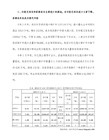
a- quatre 四
thalasso- mer 海
théo- dieu 神
therm(o)- chaleur 热
top(o)- lieu 地方
typo- caractère 型,版
syn-/sym- avec, ensemble 共,同,合
tachy- rapide 快,迅速
tauto- le même 同样
taxi- arrangement 安排,整理
techn(o)- art, science 技术,工艺
télé- de loin à distance 远,远距离
cycl(o)- cercle 圈,环;循环
cyto- cellule 细胞
dactyl(o)- doigt 指,趾
démo- peuple 人民;人口
derm(o)-/dermato- peau 皮,皮肤
di- deux 二,双;二重
di(a)- séparé de, à travers 分离;通过,横过
hypn(o)- sommeil 睡眠;催眠
hypo- sous; insuffisance 下,在…下;少,不足
hystér(o)- utérus 子宫
icon(o)- image 像,肖像;图像
idé(o)- idée 思想,观念
idi(o)- particulier 特有的,个人的
hépat(o)- foie 肝
hept(a)- sept 七
hét
éro- autre 异
hex(a)- six 六
hiér(o)- sacré 圣,神圣
hipp(o)- cheval 马
法语常见前缀后缀
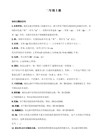
hydr(o)- eau 水
hygro- humide 湿
hyper- ser, au-dessus; excès 超出,在…上;过度
hypn(o)- sommeil 睡眠;催眠
hypo- sous; insuffisance 下,在…下;少,不足
hystér(o)- utérus 子宫
rhodo- rose 玫瑰色
sarco- chair 肉
schizo- fendre 分裂
séma- signe 记号,信号,
sidér(o)- fer 铁
somat(o)- corps 躯体
spélé(o)- caverne 洞穴
sphér(o)- globe 球
stéré(o)- solide 立体的;坚固的
chron(o)- temps 时间
chrys(o)- or 黄金;金黄色
cinémat(o)-/ciném(o)- mouvement 动,运动
copro- excrément 粪
cosm(o)- monde 宇宙‘世界
cryo- froid 低温,冷冻
crypt(o)- caché 隐藏的
électr(o)- ambre jaune (d’où électricité) 琥珀(专指电)
embryo- f?tus 胚胎
encéphal(o)- cerveau 脑
end(o)- à l’intérieur 内,内在
entér(o)- entrailles 肠
entomo- insecte 昆虫
hépat(o)- foie 肝
法语词缀(前缀)

1. 表⽰“否定”的前缀 a-,an-,不,⾮,⽆ apolitique[不问政治的];anonyme[不具名的] im-(il-,im-,ir-)不,⾮,⽆ inaltérable[不变质的];illisible[不清楚的];immangeable[不能吃的];irréel[不现实的] non- 不,⾮,⽆ nonchalant[漫不经⼼的];non-métal[⾮⾦属] 2. 带有“强化”意义的前缀 archi- 极端;过度 archifou[极疯狂的;极傻的] extra- 超;极端;过度 extra-fin[极精细的;特优的] hyper- 超;过度 hypersensible[过分敏感的] super- 超越;过度;⾼级 supermarché[超级市场] sur- 超过;过分 suralimentation[过度营养] ultra 超;过度;极端 ultramoderne[极现代化的] 3. 表⽰“同情”、“敌视”或“对⽴”的前缀 anti- 反对,反抗 antidémocratique[反民主的] antidote[解毒的] contre- 反对;相反 contre-attaque[反击] pro- 赞成,亲 procommuniste[赞成共产党的]prochinois[亲华的] 4. 表⽰“时空关系”的前缀 anté- 先,前;在…之前 antécombrien[前寒武纪的]antéposer[前置,放在前⾯] après- post- 后;在…之后 après-demin[后天] après-gurre[战后] postface[后记,跋] avant- pré- 先,前,在…以前 avant-hier[前天] préétabli[预定的] co-con- 共,同,合,和,相互 co-auteur[合作者] concitoyen[同乡] entre- 之间 entreacte[幕间休息] ex- 前 ex-ministre[前部长] extra- 外;在…之外 extra-terrestre[地球之外的] inter- 在…之间 interscolaire[校际的] intra- 内部,在内 intramusculaire[肌⾁内的] trans- 横贯,穿过 transnational[跨国的] 5. 常见动词前缀 a- ⽅向;⽬的,使 abaisser[放下] attendrir[使变软] anté- 先,前 antéposer[前置] auto- ⾃⾏,⾃动;⾃⾝ automatiser[使⾃动化] co- 共,同,合,相互 coexister[共存] con- col- com- cor- 共,同,合,相互 concorder[相符,协调] combiner[组合,联合] collaborer[合作,协作] correspondre[符合] contre- 反对;相反 contre-attaquer[反攻,还击] dé-,dés- 分离;去除,解除 dépoétiser[使失去诗意] dis- 否定 disjoindre[拆开] é-,ef-,es- 分离,去除,失去 échanger[交换,互换] égarer[使迷路] en-,em- 使成为 engraisser[使肥沃] emmaigrir[使消瘦] entr- 相互 s''entretuer[⾃相残杀] ex- 出,外 exclure[开除;排斥] in-,il-,im- 不,⽆,⾮; 向,⼊,内 invalider[使⽆效] impatienter[使不耐烦] inter- 禁⽌ 相互关系 interdire[禁⽌] interconnecter[使…互连] intro- 向内,进⼊ introduire[引⼊,介绍] mal- 坏,恶;错 malmener[虐待] micro- 微,⼩ microminiaturiser[使微型化] mono- 单独的 momologuer[⾃⾔⾃语] monopoliser[垄断,专营] multi- 多,复 multiplier[增多] poly- 多,聚 polycopier[油印] post- 后,在…后 postposer[后置,放在后⾯] pré- 前 prévenir[预防] re-,ré- 再,重新 refaire[重做] réimprimer[重印] r- 逆,反 rajuster[再调整] rétro- 向后,追溯 rétroagir[追溯既往] sous- 不⾜;再 sous-amender[再修正] sub- 再,在…下 subordonner[使从属于] super- 在上⾯;超越 superfinir[超精加⼯] sur- 在上;超过 surmonter[置于…上] trans- 横贯,穿过;变化 transcrire[眷写] transpercer[穿过] ultra- 超过,极度 ultracentrifuger[超速离⼼分离] uni- 单⼀ unifier[统⼀,划⼀]。
法语前缀后缀大全
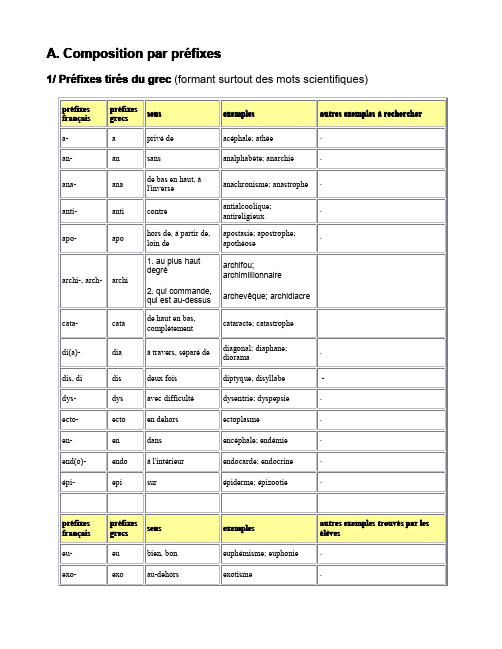
position par pr prééfixes1/Pr Prééfixes tir tiréés du grec(formant surtout des mots scientifiques)2/Mots grecs servant de pr prééfixes ou entrant dans la composition des mots fran franççais hemi-hemi demi hémicycle;hémisphère -hyper-hyper sur,au-dessus hypermétrope;hypertension;hypertrophie -hypo-hypo soushypogée;hypoténuse -méta-metaaprès,changement métamorphose;métaphysiquepara1.près de2.contreparallèle;paratyphoïde paradoxe éri-peri autour périoste;périphrase prodevant,pour prognathe;prolepse un prototype syn-,sym-synavecsynthèse;sympathieun synonyme,arithm(o)-nombre arithmétique-artério-artère artériosclérose-arthr(o)-articulation arthrite;arthropodes-astér(o)-,astr(o)-astre,étoile astérisque;astronaute-auto-1.de soi-même2.abrév.deautomobileautobiographie;autodidacte;automobileautocar;autostrade-bactéri(o)-bâton bactéricide;bactériologie-baro-pesant baromètre-biblio-livre bibliographie;bibliothèque-bio-vie biographie;biologie-blasto-germe blastoderme-bléphar(o)-paupière blépharite-brachy-court brachycéphale-brady-lent bradycardie;bradypsychie-brom(o)-puanteur.brome;bromure-bronch(o)-gorge bronche;bronchique;broncho-pneumonie-bryo-mousse bryophile-butyr(o)-beurre butyrique-caco-,cach-mauvais cacographie;cacophonie;cachexie-calli-beau calligraphie-cardi(o)-coeur cardiaque;cardiogramme; cardiographie-cén(o)-commun cenobite;cénesthésie-céno-vide cénotaphe-céphal(o)-tête céphalalgie;céphalopodescuivre chalcographiechir-main chiromancievert chlorate;chlorhydrique é)-bile cholagogue;cholémiechrom(o)-couleur chromatique;chromosometemps chronique;chronographie; chronologie;chronomètre-suitechrys(o)-or chrysostome;chrysolithe émat(o)-,ciné-,cinét(o)-mouvementcinématographe;cinétiquecoquille conchylien;conchyliologie monde cosmique;cosmogonie;cosmopolite cachécrypte,cryptogame;bleu cynurecercle cyclique,cyclone cellule cytologie doigtdactylographie éca-dix décamètreém(o)-peuple démocrate;démographie dermato-peau derme;dermique;dermatologie enseignerdidactique éca-douze dodécagone long dolichocéphale lance doryphoreforcedynamite;dynamomètre chin(o)-épine,hérisson échinoderme lectr(o)-ambre jaune électrochoc foetusembryologie ér(o)-entrailles entérite insecteentomologiste-gloss(o)-langue glossairedoux glucose;glycogène; glycér(o)-doux glycérineécrire graphologieéco)-femme gynécée;gynécologiecercle gyroscopesacréhagiographiesel halogènecent hectomètreéli(o)-soleil héliothérapieémat(o)-,hémo-sang hématose;hémorragieépat(o)-foie hépatiquesept heptasyllabeétéro-autre hétérogènesix hexagoneér(o)-sacréhiéroglyphecheval hippodrometissu histologieéo-,hom(o)semblable homéopathie;homologueheure horoscopeeau,(fluide)hydraulique;hydre; hydrologie;hydrothérapiehumide hygromètre;hygroscopesommeil hypnose;hypnotismeér(o)-utérus hystérographieimage icône;iconoclasteé(o)-idée idéogramme;idéologieparticulier idiome;idiotismeégal isomorphe;isothermemille kilogrammegorge laryngologieblanc leucocytepierre lithographiquediscours,science logomachiemacro-grand macrocéphale;macrocosmeéga-,grand mégalithe;mégalomanemégalo-chant mélodique;mélodrameés(o)-milieu mésopotamienétéor(o)-élevédans les airs météore;météorologieétr(o)-mesure métrique;métronomepetit microbe;microbiologie;haine misanthrope;misogyneém(o)-mémoire mnémotechniqueseul monogramme;monolitheforme morphologiechampignon mycologiedix mille myriadelégende mythologieécro-mort nécrologie;nécropoleéo-nouveau néologisme;néophyteéphr(o)-rein néphritenévr-nerf neurologie;névralgiemaladie nosologieocto-huit octaèdre;octogonedent odontologiepeu nombreux oligarchiesongéoniromancieoeil ophtalmologieoiseau ornithologistemontagne orographiedroit orthographe;orthopédie l'orthodontiste,l'orthophoniste osté(o)-os ostéite;ostéomyéliteoreille oto-rhino-laryngologieaigu,acide oxyton;oxygèneépais pachydermeéo-ancien paléographie;paléolithiquepant(o)-tout panthéisme;pantographesouffrance pathogène;pathologieéd-enfant pédagogie;pédiatriepenta-cinq pentagone-suite3/Pr Prééfixes d'origine latine ou mots latins entrant dans la composition des franççaismots franpréfixes exemples exemples trouvés par lesélèvesmulti-multicolore;multiforme;multipleocto-octaèdre;octosyllabeomniscient;omnivorepénéplaine;pénultièmetra rs percolateur;perforerès postdater;postscolaireé-préétabli;préhistoire;préliminaireavant projeter;prolongerquadrijumeaux;quadrupèdequasi-contrat;quasi-délitquinquagénaire;quinquennalradiographie;radiologiete-nouveau rouvrir;réargenterétro-retour rétroactif;rétrogradersimiligravure;similimarbresubalterne;subdélégué;subdivisersupra-superstructure;supranationalàde,àtraverstransformer;transhumanttripartite;trisaieulàde ultrason;ultravioletuniformela place de vice-amiral;vice-consulposition par suffixes 1/Suffixes d'origine grecque【中文/法文】考试教材试题生活资料下载集合(9月27日更新)/thread-381856-1-1.html教材:【下载】《新概念法语》(4DVD+MP3+电子书)[DVDRip]【下载】《走遍欧洲-法语初级-现在就说》【下载】《法语脱口说》(Talk to Me)[ISO]新无国界第一册MP3下载(9月27日更新以上)《灵格风法语会话通》(文字教材及配套MP3)下载【教材】《法语交际口语渐进-练习三百六十五题听力磁带》【教材】《法语语音渐进配套磁带转mp3》大学法语简明教程【PDF】简明法语教程参考答案PDF下载新概念法语(9月1日更新)法语会话三月通视频+解析《开口就会说法语.[mp3]》(8月24日更新)【课程下载】三十天跨出国门——法语篇mp3《灵格风法语会话通——从入门到精通》完整清晰版(8月24日更新)Babylon法语词典合集(8月24日更新)《无师自通法语书附光盘》(8月24日更新)《在你的车中学习-法语》(8月24日更新)《Tandem》第1册及练习.pdf新概念法语教材图片+文字新东方.法语入门一月通.rarTAXI扫描版法语教学图书及练习题【下载】大学法语简明教程【推荐下载】法语学习软件法语初级者必备:法语笔记【法语发音】法语26字母发音mp3及法语几则发音规则下载[下载]原版法语动词变位详解【下载】法语语法和逻辑分析及词汇真题《法语 综合百科全书 2007》巴黎高科的法语上课材料我的法语课资料上海译文社-法语实用语法.pdf考试:【考试】全国翻译考试:法语二、三级翻译考试时间及真题下载法语阅读短篇及解析下载简明法语教程参考答案PDF下载TEF 单词表电子版下载 共7392单词高清TEF法语真题机经500题下载9套TEF真题加答案解析下载公共法语试题下载 大学法语四级模拟试题PDF【下载】大学法语四级考试必读 :法英对照大学法语1-4级词汇超常速记【下载】法语新实用语法MP3【下载】上海紧缺人才考试法语类考试BC级考纲以及词汇表.rar【下载】大学法语四级考试大纲+样题+答案+听力(9月27更新以上)大学法语四级考试大纲中听力文本+MP3TEF 单词表电子版下载 共7392单词【分级】法语等级考试分数对照换算表:TEF/TCF/DELF/DALF高清TEF法语真题机经500题下载【法语考试】2006年同等学力人员申请硕士学位外国语水平全国统一考试真题pdf最新2009年全国高等学校法语专业八级考试真题及答案【转】09年法语专八考试亲历帖《大学法语四级考试历年真题MP3》【法语考试】转:2008年6月17日北京TCF超详回忆+备考体会法国留学签证面试辅导手册.pdfTEF网友回忆真题.pdf2008年法语TCF考试机经大全【法语考试】TCF考试简介TCF考试的报名与考试流程(实用版)【法语考试】TEF考试简介【转】专访(上):紧缺“小语种”法语专家束景哲【转】专访(下):紧缺“小语种”法语专家束景哲生活:法语名著下载 《基督山伯爵》PDF电子书【下载】莫泊桑 Le Horla 适合初学者阅读的中短篇小说【下载】法语杂志Elle200708.rar【下载】法语阅读:《小王子》的作者圣·埃克苏佩里另一畅销小说-夜航Vol de nuit.【下载】法语阅读:莫泊桑羊脂球原版小说.pdf【下载】汉法对照胡锦涛主席2009新年贺词【下载】法语电子杂志-2008年1月ELLE杂志(9月27日更新以上)【下载】Various Artists -《法语香颂百年纵览》精装版【听力下载】法语时事新闻2009.9.11听力+文本[下载]即学即用法语120句.pdf【下载】加缪《L'étranger(局外人)》法语原版【法语听力】法语哲理小故事MP3带一本书去巴黎PDF法兰西式浪漫:12部必看经典法国电影中法对照《相约星期二》电子书下载[中法对照]法语版心灵鸡汤【MP3下载】《小王子》经典唱段《我的玫瑰》【法语学习】法语故事《loulou et bertille à l'aventure》(MP3)【最受法语初学者欢迎的影视教材】勇猛的小红狼(文本+MP3)(更新完成)【法语中级听力】中法双语对照·都德《最后一课》(MP3下载)【法语读物】阿里巴巴与四十大盗.rar【法语读物】基度山伯爵.rar【法语读物】悲惨世界中法对照《相约星期二》电子书下载2008北京奥运会吉祥物福娃法文介绍法语的十二生肖介绍,很可爱~~法语各种数词写法教你输入法语特殊字符【资料】中国美食法语词汇(完整版)【资料】典型法国餐馆菜单(完整版)很多女生都会喜欢的一首法语歌《savoir aimer懂爱》QQ法语聊天的常用语《图说法国女性-美丽与风流》(8月24日更新)【法语下载】蒙特利尔【法语歌曲】Sheryfa Luna 你别离开【经典香颂】快女郁可唯演绎玫瑰人生【香颂】自在生活 Clémence(8月24日更新)法语版圣经下载La Bible(8月24日更新)【日常实用法语】赶快、紧急、保证、理解、放弃、批评、挑剔日常实用法语:不欣赏、疯癫、厌恶、失望、指责、威胁、脏话日常实用法语:沮丧、疲惫、受够了、生气、记忆、怎么了、爱情【日常实用法语】赶快、紧急、保证、理解、放弃、批评、挑剔【法语休闲】法国历史漫画书.rar卢梭《书信集》法语原文.pdf法语歌曲:越狱法语版主题曲《人生苦短(pas le temps)》法语名著欣赏:俊友1巴黎圣母院电子版图文介绍达芬奇密码法语版【下载】蓝莲花法语汉语原版连环画词汇翻译:《法语基础词汇宝典》WORD+MP340天突破7000词:法语初中级词汇.rar外研社:法语动词解析词典TEF 单词表电子版下载 共7392单词(8月31日更新)聊法语之谚语解析1047个最基本词汇英法对照.pdf(8月24日更新)建筑业专业词汇汉法对照奥运开闭幕式国宴菜单【双语】法预计2010年中期摆脱危机法国政治经典短句牛年教你关于牛的法语谚语【下载】翻译参考资料-法语姓名译名手册。
法语词缀

主题: 法语常用词缀1. 表示“否定”的前缀a-,an-, 不,非,无 apolitique[不问政治的];anonyme[不具名的]im-(il-,im-,ir-)不,非,无inaltérable[不变质的];illisible[不清楚的];immangeable[不能吃的];irréel[不现实的]non- 不,非,无 nonchalant[漫不经心的];non-métal[非金属]2. 带有“强化”意义的前缀archi- 极端;过度 archifou[极疯狂的;极傻的]extra- 超;极端;过度 extra-fin[极精细的;特优的]hyper- 超;过度 hypersensible[过分敏感的]super- 超越;过度;高级supermarché[超级市场]sur- 超过;过分 suralimentation[过度营养]ultra 超;过度;极端 ultramoderne[极现代化的]3. 表示“同情”、“敌视”或“对立”的前缀anti- 反对,反抗antidémocratique[反民主的]antidote[解毒的]contre- 反对;相反 contre-attaque[反击]pro- 赞成,亲 procommuniste[赞成共产党的]prochinois[亲华的]4. 表示“时空关系”的前缀anté- 先,前;在…之前antécombrien[前寒武纪的]antéposer[前置,放在前面] après- après-gurre[战后]postface[后记,跋]avant-pré- 先,前,在…以前 avant-hier[前天]préétabli[预定的]co-con- 共,同,合,和,相互 co-auteur[合作者]concitoyen[同乡]entre- 之间 entreacte[幕间休息]ex- 前 ex-ministre[前部长]extra- 外;在…之外 extra-terrestre[地球之外的]inter- 在…之间 interscolaire[校际的]intra- 内部,在内 intramusculaire[肌肉内的]trans- 横贯,穿过 transnational[跨国的]5. 常见动词前缀a- 方向;目的,使 abaisser[放下]attendrir[使变软]anté- 先,前antéposer[前置]auto- 自行,自动;自身 automatiser[使自动化]co- 共,同,合,相互 coexister[共存]con-col-com-cor- 共,同,合,相互 concorder[相符,协调]combiner[组合,联合]collaborer[合作,协作]correspondre[符合]contre- 反对;相反 contre-attaquer[反攻,还击]dé-,dés- 分离;去除,解除dépoétiser[使失去诗意] dis- 否定 disjoindre[拆开]é-,ef-,es- 分离,去除,失去échanger[交换,互换] égarer[使迷路]en-,em- 使成为 engraisser[使肥沃]emmaigrir[使消瘦]entr- 相互s’entretuer[自相残杀]ex- 出,外 exclure[开除;排斥]in-,il-,im- 不,无,非;向,入,内 invalider[使无效]impatienter[使不耐烦]inter- 禁止相互关系 interdire[禁止]interconnecter[使…互连]intro- 向内,进入 introduire[引入,介绍]mal- 坏,恶;错 malmener[虐待]micro- 微,小 microminiaturiser[使微型化]mono- 单独的 momologuer[自言自语]monopoliser[垄断,专营]multi- 多,复 multiplier[增多]poly- 多,聚 polycopier[油印]post- 后,在…后 postposer[后置,放在后面]pré- 前prévenir[预防]re-,ré- 再,重新 refaire[重做]réimprimer[重印]r- 逆,反 rajuster[再调整]rétro- 向后,追溯rétroagir[追溯既往]sous- 不足;再 sous-amender[再修正]sub- 再,在…下 subordonner[使从属于]super- 在上面;超越 superfinir[超精加工]sur- 在上;超过 surmonter[置于…上]trans- 横贯,穿过;变化 transcrire[眷写] transpercer[穿过]ultra- 超过,极度 ultracentrifuger[超速离心分离] uni- 单一 unifier[统一,划一]TEF考试常用词解析1、pour que 为了+虚拟, afin que 为了,以便+虚拟2、afin de +inf. , à l’intention de (为了)3、parce que,car,en effet,因为 puise que 既然 comme 因为,既然 (多置于句首) du fait de (因为,由于) suite à / à la suite de / en raison de (鉴于,因为)4、pendant que 主从句谓语表示的时间长度一致, durant 在…期间, avant que 在……之前+虚拟(在主从句主语不一致时用,一致时用de),5、après avoir f. qch, jusqu’a ce que+虚拟直到…以后6、bien que=quoi que+虚拟=tout que =encore que=même…(虽然,尽管),malgré+短语,eg: Même avec trios enfants, elle travaille toujours comme ducumentaliste.7、Même si (即使), meme que(甚至), même…(虽然,尽管),quitter à(即使,哪怕),quel que+虚拟(不管) eg: Quel que soit le lieu de votre stage(en entreprise ou en société. En attendant (尽管) en dépit de (不顾)8、Si…que中间夹adj.adv谓语用虚拟(不管…总)eg: Si beau qu’il soit,l’automne raccourait les jours/ Si courageux qu’il soit, il échouera.9、si+直陈式(如果) si+条件式 (建议)10、au cas où+条件式 (如果…就) eg: Au cas où complication se produirait,faites moi venir/ avertissez moi.11、pourvu que +虚拟式 (只要…便,但愿)12、de (telle)façon/manière (so that) (表目的用虚拟式,表结果用直陈式)13、tellement+adj.+que tant/tellement de+n.+que14、de manière à / de façon à+inf. (so as to) (以便)15、à la manière / à façon de (如同)16、de manière / façon à ce que+subj. (为了)17、助动词+tant / tellement+过分+que (so…that)18、en quelque façon / moyen (C’est un façon comment les français vivent.)19、de la bonne façon / comme il faut / à propos (properly), en te mps et en lieu (adv.合适的时间,地点)20、enfin 总之, ainis 因此, donc 所以, c’est pourquoi 所以 en un mot 总之 au total (总之,毕竟) aussi+主谓倒装 (所以), à cet effet (为此), si bien que (因此,以致), en somme (总之,毕竟), par suite de 因此eg: Leur habilete etait grande de sorte que nous etions s aisis d’admiration. (表结果)Nous etions surpris au point que nous ne pouvions dire un mot. (表结果)21、mais/seulment(可是)cependant/pourtant/néanmoins/toutefois/par contre(尽管…可是) alore que(conj.而,却、当)eg:Vous pouvez allez le voir,seulment ne restez pastrop longtemps. Au lieu que (conj.非但不…反而+subj./而)eg: Au lieu qu’il se laisse intimider pas les diffcultés, il les affronte courageusement. / Au lieu de prendre l’avion,nous prendrons le train.22、avoir lieu, en premier lieu23、à tout le /au /du moins+倒装/不倒装(至少)eg: Il a été reçu premier, du moins il le pretend24、à moins que+subj.(除非)sans que(没有,不,除非,尽管没有,无须)25、si ce n’est que(要不是,除非)(注意)Ta journée a été longue,il n’en reste pas moins que tu dois terminer tes devoirs.=Bien que ta journée ait été longue,tu dois t erminer tes devoirs.=tu dois terminer tes devoirs alors que la journée a été longue.26、ne…pas moins/n’en…pas(仍然是)eg:Bien que…il n’en est pas moins…/ le lentmain,ma decision n’etait pas moins ferme. /quand même/tout de même27、d’ailleurs/du reste/en outre(而且), outre que(besides ,in addition to), par-dessus le marché(此外,另外),de plus, aussi bien(况且)eg: Je ne veux pas y aller, aussi bien est-il trop tard.28、n.+bon/ meiller marché, à bon/ meilleur marché(adv.)29、en tant que/ être(作为)30、ne…ni…ni eg: Il n’y en a ni plus ni moins.31、sans…ni eg: Du th"e, S.V.P sans sucre ni lait.32、soit…soit… (或此或彼)33、ou…ou… (表强调)eg: Ce sera ou vous ou moi.(不是你就是我) / Ou l’amour ou la haine en est la cause.34、antôt…tantôt…(一会…一会)35、avoir failli+inf.(险些,差点)prèsque(几乎,差不多)36、à propos de / en function de (关于…/根据…),en ce qui concerne / quant à / à l’egard de (关于), en conformité de (根据), vu / attendu (鉴于), concernant(关于), suivant(根据), touchant(关于)37、en matière de (关于,论及,在…方面), se rapporter(与…有关) au sujet de(关于,对于), à raison de(按照,根据…)38、à part de cela (apart from that) / excepté (que)/ à l’exception de (除…之外)/ outre(prep.除…之外)/ sauf que(除…之外,只是), sauf cas…(除了…的情况)eg: Elle mis à part la figure,est une inconne pour lui.39、de plus en plus / peu à peu(渐渐地), de temps en temps (不时地), de moins en moins, de jour en jour(日益)40、de porte en porte(挨家挨户), de loin en loin(adv.相隔很远/很久) de suite(adv.连续地)41、plus ou moins(或多或少) au moins / tout au plus42、à point(正好) / à temps (及时) / à l’heure43、au moyen de / par le moyen de (用…方法)eg: Il n’a pas les moyens de s’offrir la voiture qu’il aime.=La voiture dont il rêve est trop chère pour lui.44、dès lors / dèsormais=dorénavant / dès demain dès que / lors que=quand, lors même que(even when), lors de eg: lors de son mariage(when he was married) dès que (as soon as)45、sinon / autrement / sana quoi (否则,更加,不一样的)46、à se moment, à ce moment là / alors (那时)47、non seulement…mais encore…(不但…而且) non seulement…mais aussi…48、par imposspble / si par hasard / une fois que+虚拟式/ au cas où+条件式/ venir à(万一)49、dans p rès / sous près(adv. 不久以后), (un) peu près(过了一会)/ tout à l’heure50、par rapport à(与…相比) en regard(adv.对照) en comparasion de (对…而言)51、sous le rapport de (在…方面/ 从…方面,角度) en fait de (关于,说到,在…方面) au regard de (对…而言)52、tandis que (当…时候,然而,而)53、tant…que (只要…就)54、tant bis / tant mieux (那就好了)55、tant s’en faut que=loin de56、a l’issue de (在…之后)/ à la suite de / suite à qch. (在…之后,由于)57、et ainsi de suite (adv.就这样继续下去)58、a tort et à travers(七颠八倒), par coer(牢记)59、à pied(步行), à la hate(匆忙), de suite(继续), à loisir(闲时), juste(正确) clair (明晰), ferme(坚定)60、à peine(差一点), à demi(一半), à moitié(一半), évidement(明确地)61、许多数量副词后面可以接以介词de引导的名词,表示该名词的数量,baucoup,taut, autant,davantage 等不能直接修饰名词。
法语前缀、后缀派生词及其在词汇教学中的应用

法语前缀、后缀派生词及其在词汇教学中的应用作者:孔鑫来源:《科技视界》2018年第28期【摘要】法语是一门词汇量非常丰富的语言,其中派生词在现代法语词汇中占据最大比重。
最典型的派生体现在词缀上,文章从常见的前缀与后缀形式入手,分析词缀给词语带来的词形、词义、语法属性的变化,并将理论学习与教学实例相结合,提出相应的教学策略。
【关键词】法语词汇;派生构词法;词缀;法语教学中图分类号: H32 文献标识码: A 文章编号: 2095-2457(2018)28-0205-003DOI:10.19694/ki.issn2095-2457.2018.28.094在法语教学过程中,词汇教学是重要组成部分之一,是学习者语言能力的基石。
然而,作为一门词汇量非常丰富的语言,法语庞大的词汇量往往给学生们的词汇学习、记忆与使用造成一定的困难。
在学习过程中,如果能通过教师的课堂授课与引导,帮助学生们发现与归纳法语单词与单词之间的联系,分析与研究法语词汇的结构,探索与总结其中的构词规律,必将提高教学效果,并对学生们带来启发与帮助。
本文从构词法中的派生构词法入手,主要分析其中的前缀派生词和后缀派生词,通过常用前缀、后缀的归纳与举例,前后缀的词形、词义、语法属性的变化,以及在法语词汇教学中的应用等几个方面,试图为“教”与“学”双方带来助益。
1 派生构词法(dérivation)法语词汇的构词法可以归纳为派生构词法与复合构词法,其中派生是法语词法学最重要的构词法,指在词根基础上,进行一定的更改,从而构成新词的一种方法。
法语词汇的“派生”形式多样,主要表现为前缀(préfixation)、后缀(suffixation)、复合型派生(dérivation parasynthétique)、逆向派生(dérivation inverse)、词类转换派生(dérivation impropre)等。
- 1、下载文档前请自行甄别文档内容的完整性,平台不提供额外的编辑、内容补充、找答案等附加服务。
- 2、"仅部分预览"的文档,不可在线预览部分如存在完整性等问题,可反馈申请退款(可完整预览的文档不适用该条件!)。
- 3、如文档侵犯您的权益,请联系客服反馈,我们会尽快为您处理(人工客服工作时间:9:00-18:30)。
向,入,内 invalider[使无效]
impatienter[使不耐烦]
inter- 禁止
相互关系 interdire[禁止]
interconnecter[使…互连]
intro- 向内,进入 introduire[引入,介绍]
mal- 坏,恶;错 malmener[虐待]
dis- 否定 disjoindre[拆开]
é-,ef-,es- 分离,去除,失去 échanger[交换,互换]
égarer[使迷路]
en-,em- 使成为 engraisser[使肥沃]
emmaigrir[使消瘦]
entr- 相互 s''entretuer[自相残杀]
ex- 出,外 exclure[开除;排斥]
non- 不,非,无 nonchalant[漫不经心的];non-métal[非金属]
2 带有“强化”意义的前缀
archi- 极端;过度 archifou[极疯狂的;极傻的]
extra- 超;极端;过度 extra-fin[极精细的;特优的]
hyper- 超;过度 hypersensible[过分敏感的]
trans- 横贯,穿过 transnational[跨国的]
5 常见动词前缀
a- 方向;目的,使 abaisser[放下]
attendrir[使变软]
anté- 先,前 antéposer[前置]
auto- 自行,自动;自身 automatiser[使自动化]
co- 共,同,合,相互 coexister[共存]
concitoyen[同乡]
entre- 之间 entreacte[幕间休息]
ex- 前 ex-ministre[前部长]
extra- 外;在…之外 extra-terrestre[地球之外的]
inter- 在…之间 interscolaire[校际的]
intra- 内部,在内 intraote[解毒的]
contre- 反对;相反 contre-attaque[反击]
pro- 赞成,亲 procommuniste[赞成共产党的]prochinois[亲华的]
4 表示“时空关系”的前缀
anté- 先,前;在…之前 antécombrien[前寒武纪的]antéposer[前置,放在前面]
super- 超越;过度;高级 supermarché[超级市场]
sur- 超过;过分 suralimentation[过度营养]
ultra 超;过度;极端 ultramoderne[极现代化的]
3 表示“同情”、“敌视”或“对立”的前缀
anti- 反对,反抗 antidémocratique[反民主的]
super- 在上面;超越 superfinir[超精加工]
sur- 在上;超过 surmonter[置于…上]
trans- 横贯,穿过;变化 transcrire[眷写]
transpercer[穿过]
ultra- 超过,极度 ultracentrifuger[超速离心分离]
uni- 单一 unifier[统一,划一]
con-
col-
com-
cor- 共,同,合,相互 concorder[相符,协调]
combiner[组合,联合]
collaborer[合作,协作]
correspondre[符合]
contre- 反对;相反 contre-attaquer[反攻,还击]
dé-,dés- 分离;去除,解除 dépoétiser[使失去诗意]
micro- 微,小 microminiaturiser[使微型化]
mono- 单独的 momologuer[自言自语]
monopoliser[垄断,专营]
multi- 多,复 multiplier[增多]
poly- 多,聚 polycopier[油印]
post- 后,在…后 postposer[后置,放在后面]
法语词缀(前缀)简表
1 表示“否定”的前缀
a-,an-, 不,非,无 apolitique[不问政治的];anonyme[不具名的]
im-(il-,im-,ir-) 不,非,无 inaltérable[不变质的];illisible[不清楚的];immangeable[不能吃的];irréel[不现实的]
pré- 前 prévenir[预防]
re-,ré- 再,重新 refaire[重做]
réimprimer[重印]
r- 逆,反 rajuster[再调整]
rétro- 向后,追溯 rétroagir[追溯既往]
sous- 不足;再 sous-amender[再修正]
sub- 再,在…下 subordonner[使从属于]
après-
post- 后;在…之后 après-demin[后天]
après-gurre[战后]
postface[后记,跋]
avant-
pré- 先,前,在…以前 avant-hier[前天]
préétabli[预定的]
co-con- 共,同,合,和,相互 co-auteur[合作者]
